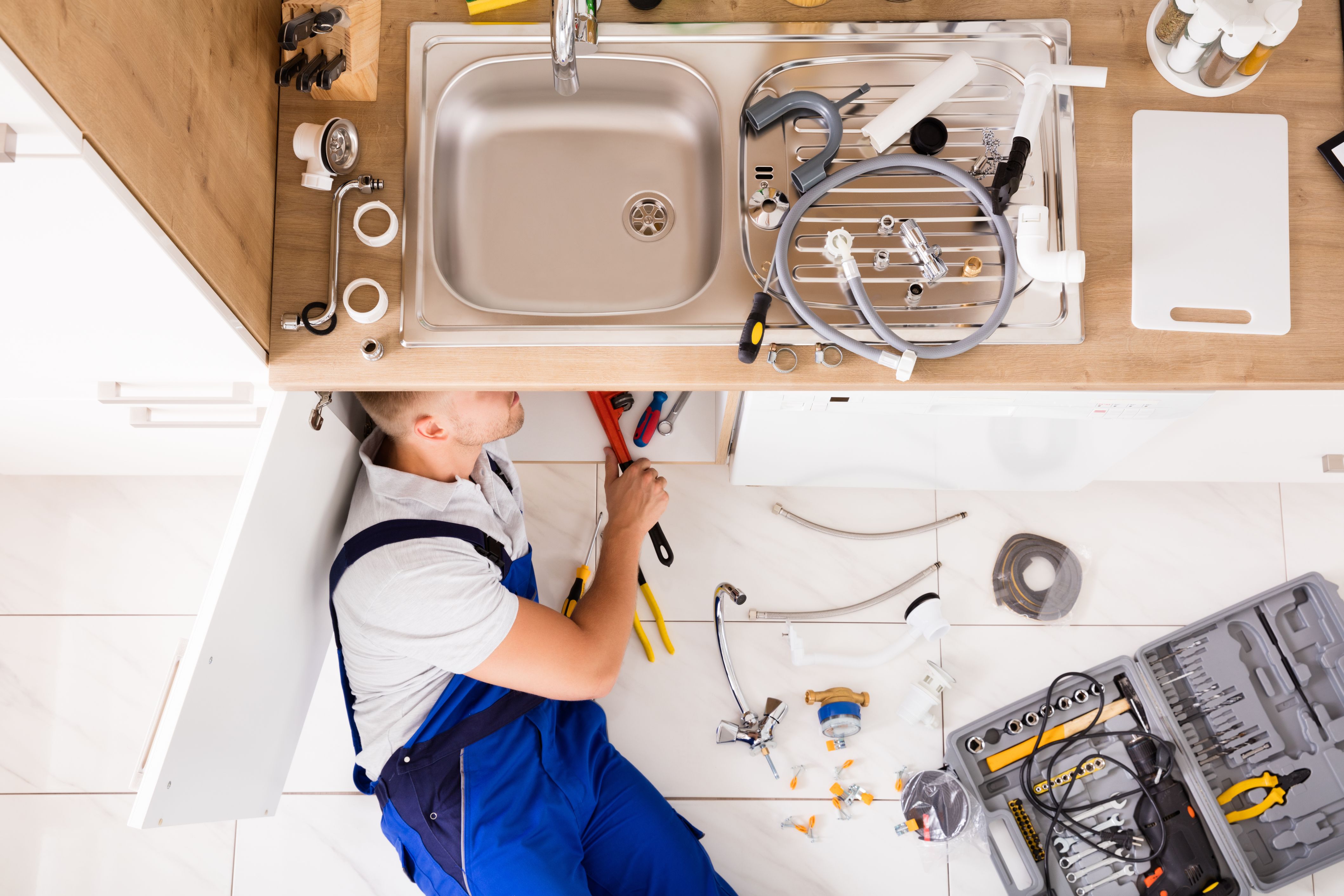Plumber Salary and Employment Outlook Information
Plumber salary averages are not as high as you might think, but they do make a decent living. Plumbers repair and install drainage, water, and gas pipes residentially and commercially. They also install fixtures like sinks, toilets, showers, and bathtubs. And, they install and maintain appliances like water heaters, disposals, and dishwashers. Repair work is a large part of what they do as well. Plumbers are called upon to fix clogs, leaks, and broken appliances. Some also maintain residential septic systems for homes that are not connected to municipal sewer systems.
Plumbers work in all sorts of environments. Some specialize in residential installations and repair. Others work in factories or on construction sites. There is a lot of heavy lifting as well as climbing and working in tight spaces. There can be a large amount of travel as well. They have an above average risk of occupational injury from falling off ladders, being cut with sharp tools, or getting burned from steam or soldering equipment. Most work full time, which includes nights and weekends as well overtime and being on call for emergencies.
The median plumber salary per hour is $22.43. The US Department of Labors plumber salary pay scale shows that the median annual wage is $46,600, with the top 10% earning close to $80,000 a year. Apprentices start at about 30% the rate of a fully trained and licensed plumber and earn a higher plumber salary as their skills improve. Plumbers are often members of a labor union.
Even in these trying times, job prospects for plumbers are good. Employment numbers are growing at a rate above the national average. The demand for plumbers is being driven by the revival of the construction industry and new efficiency standards for plumbing systems. Because plumbing is tied to the construction business, employment opportunities can fluctuate with the economy.
Most plumbers learn the trade as an apprentice. Apprentices log about 2200 hours of work experience and technical education every year for 4 to 5 years. A prospective apprentice must be at least 18 years old, have a high school diploma or equivalency, and be able to pass a drug test. Math and computer knowledge is needed as well. Apprentice programs are run by businesses as well as labor unions. Most jurisdictions require plumbers to be licensed. License requirements usually include 2 to 4 years of work experience and a passing score on a licensing test that covers trade knowledge and local plumbing code information. There might be an additional test for licensing to work on gas lines.
All plumbers need to possess customer service skills, as they work with customers regularly. Those that run their own business must possess basic managerial skills. Plumbers need to be able to combine mechanical skills with physical strength and trouble shooting knowledge for diagnosing repair problems.
Plumber salary information is available from national plumbers unions as well as federal and state departments of labor. It is a competitive and rewarding field. Technical knowledge is constantly improving. Plumbers need to be able to stay abreast of the latest innovations and regulatory changes. Recent changes in policy designed to increase the nations energy efficiency and reduce the consumption of resources such as water have driven some job opportunities. Many plumbing systems that are no longer up to code need to be repaired and replaced, meaning more work for plumbers. Job prospects are good, and median salary numbers are higher than some other construction trade jobs. Education is needed, but can be received on the job as well. National median salary number might not reflect your local situation, as plumbers in some large cities make more money that the national average.
Category: Plumbers
Featured Plumbers
Related Articles
- What is the cost to repair a leaky faucet
- Toilet Repair Basics For First Time Homeowners
- How To Find A Good Plumber For Every Situation
- How to Find a Good Plumber
- How to Find the Cheapest Plumber
- How Much Should I Pay a Plumber What Do They Cost
- Gas Leak Repair
- What is a Master Plumber
- Repipes and Replumbs Best Residential Service for Homes
- Install a garbage disposal cost to install or replace
- Common plumbing faqs problems and solutions
- Frozen Pipes A Homeowners Winter Nightmare
Business News
Popular Posts
- Universal Pursuit of Happiness - Wisdom from World Religions
- Overcoming Ego and Self-Centeredness - Lessons from World Religions
- Transcending Materialism - Spiritual Practices from World Religions
- Overcoming Prejudice and Intolerance - Guidance from Global Faiths
- How Mind Balance Can Improve the Mindsets of Employees
- Interfaith Insights by 1WorldPeace - The Top 100 Universal Beliefs in Global Spirituality
- Bridging Beliefs - Finding Common Ground in Love and Respect
- The SmartGuy Vision - A United Future Through Interfaith Love and Respect
- A Cautionary Vision - The Grim Future of a Divided World Without Love and Balance
- A Tapestry of Faiths - Exploring the Common Threads in World Religions
- Fostering Harmony Among Christianity Islam Buddhism Hinduism and Judaism
- Preparing Kids for Adulthood - 15 Vital Skills They Wont Learn in School
- Navigating Diversity - Jerusalem's Tactical Approach to Interfaith Harmony
- Clearing Mental Plaque: The Path to Enhanced Communication and Divine Connection
- Why Return to Jesus Christ and the Church
- Top 50 Ways to Live Longer
- Adventurous Romance -The Key to Enhancing Relationship Chemistry
- Pork Tenderloin with Mustard Cream Sauce
- Navigating Technology and Media for Optimal Mental Well-Being
- Understanding the Link Between Mental Health and Substance Abuse
